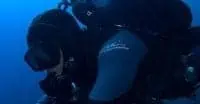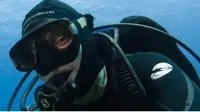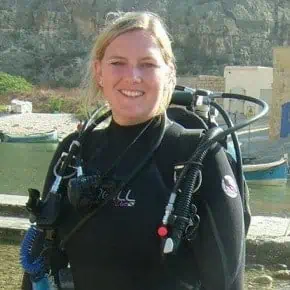A diving instructor teaches individuals and other diving teachers rudimentary and advanced scuba diving and deep sea diving techniques, theory and legislation.
Diving has remained a popular pastime worldwide since the late 1960’s, and it continues to grow in popularity, particularly in developing tourism destinations such as in South-east Asia.
Due to the complex and potentially hazardous situations leisure divers may encounter whilst participating in the sport, a level of rudimentary knowledge is essential to be able to stay safe under water.
It is the role of the diving instructor, a qualified dive teacher, to pass on theoretical knowledge to new divers and allow them to experience the wonder of open water diving.
Often, dive instructors will be working in a ‘pool’: a controlled environment which allows them to acquaint new divers with the sport in a safe way (this is also a convenient way for city dwellers to learn to dive without having to head to the coast).
For more advanced lessons, the dive teacher will take to the sea for real with groups of people under tuition.
It is essential that the dive instructor is able to manage the group safely, whilst allowing his or her pupils to build their own diving skills quickly and efficiently to pass through the various grades that are a key component to developing in this sport.
Salary
Average salary for PADI-certified (The Professional Association of Diving Instructors) dive instructors in the UK and Ireland is from £13,000 – £18,500, depending on experience and location.
There exist a large number of placements available for experienced dive instructors worldwide, particularly in South East Asia, in sought-after dive locations like Phuket, Thailand and Bali, Indonesia.
The rate of pay is typically less for overseas assignments or long term contracts, but candidates wishing to teach overseas should note that the cost of living can be much lower when compared to the UK.
It also affords a great deal of time in the water.
Responsibilities
- Candidate must complete PADI Instructor training before teaching others
- Conduct lesson in a learning environment suited to pupil’s ability and needs
- Take care of the individual or group under tuition, observing all health and safety considerations
- Act quickly in the event of an emergency or medical situation
- Remain up to date on industry movements, new equipment and new techniques
Qualifications
New candidates cannot simply begin as instructors; they must become an instructor through the PADI system of training, education and certification.
There are many levels and specific course specialisations that are required prior to reaching Instructor level.
The first step is to obtain an Open Water PADI certification; following this, the candidate will complete an Advanced Open Water certificate, followed by Rescue Diver, then Divemaster, finishing with a full Instructor accreditation.
Candidates must have at least six months of open water dive experience before attempting to pass the Instructor level course.
Complete information can be found on the PADI website
Skills
- Have a thorough understanding of dive techniques as a result of completing PADI certification
- Have a thorough understanding of equipment used to dive
- Be a strong communicator
- Be able to coach a group of individuals effectively, sometimes in potentially risky environments
- Have an enthusiasm for constant learning and improvement
- Be calm under pressure
- Have a knowledge of sea rescue techniques and first aid
Working Conditions
The actual ‘condition’ of the job is what attracts people in their thousands each year to try diving for the first time: the chance to glide through glittering worlds exploring sea life and interacting with extraordinary creatures in their natural habitat.
Regardless of the dive location, enthusiastic divers love and appreciate the sport, and this is the key driver behind their motivation for doing this as a job.
The role also carries risks and responsibility, of course, and the diving instructor’s knowledge, experience, common sense and disaster mitigation skills are paramount in protecting dive students under their care.
Risks include pressure changes in both ascent and decent, the inhalation of high-pressure gasses, supply interruption (equipment fault), and environmental factors such as dangerous animals or sharp objects under water.
Experience
A minimum of six months’ diving experience is required in order to take the final PADI qualification which then enables the candidate to become a certified instructor.
Career Progression
The typical next step for a diving instructor teaching at an established school is to move to the role of senior instructor, whereby the candidate will be handling the assignment of roles to other teachers and also dealing with marketing and planning activities on a more strategic level.
Employers
The UK is blessed with a healthy and innovative dive instruction industry, with many dive locations up and down both coastlines and in major cities too.
Some schools specialise in instructor training, whilst others are industry-specific, for example, teaching underwater welding techniques to deep sea divers.
Popular schools for PADI courses include Aquanauts (Plymouth), London School of Diving, Aquatech (Manchester) and Oyster Diving (London).
Further details are available from PADI, the industry’s recognised administrator worldwide.
Image

Also known as…
- Diving teacher
- Diving instructor
- Scuba instructor
Related Jobs
- Charter boat crew
- Captain
- Lifeguard
- Coast guard
- Armed Forces deep sea diver
- Commercial diver
What’s it really like?
Hayley Carr is a PADI-certified dive instructor with Aquanauts in Plymouth, one of south-west England’s leading dive instruction schools.
What made you decide or choose to get into this sort of career?
I love to travel, and I find the marine world and its inhabitants fascinating.
I also enjoy teaching and introducing people to new fun experiences.
Diving is a popular sport these days, and there are many people who are looking to enjoy their leisure time doing interesting, challenging and exciting activities; diving is definitely one of the most exciting adventure sports.
Do you have a standard day or a standard type of `exercise’?
No day is the same.
I teach a huge variety of courses from Open Water up to Assistant Instructor, plus I also have to deal with merchandising, marketing, updating social network sites, handling customer enquiries, dealing with bookings and managing sales.
The work is broad and you are not just spending all of your time teaching.
It rewards in quite a few different ways.
What is the most common type of problem/call-out/enquiry to which you must attend?
We don’t really have ‘problems’ as such, although the weather can cause logistical issues which we need to deal with, in terms of managing the dive while it is taking place, and also in terms of moving heavy equipment to and from locations.
What do you like most about the job?
I love the fact I can work in countries all over the world, and I get to travel a great deal.
I love also the fact that I am constantly introducing people to diving, and being a part of their amazing experience.
Good customer service and building a rapport with your students is important.
In addition, I am very much involved with marine conservation and teaching people about the wonders of the ocean and what they can do to help – it is very rewarding.
What do you like least about the job?
Lifting heavy dive cylinders – a fact of life for dive instructors!
What are the key responsibilities?
Teaching theory and practical skills for a variety of courses.
We are the only National Geographic Instructor Development 5 Star PADI Dive Centre in the area, so the variety of courses I teach is incredibly broad.
It requires a flexible approach and a lot of knowledge which I have accumulated over the years.
What about academic requirements? Any formal demands, eg A Levels?
You must become an instructor through the PADI system of training and education.
There are various steps and courses to reach this level.
The first level is to obtain your Open Water certification, then Advanced Open Water, followed by Rescue Diver, then Divemaster, finishing with Instructor.
You must have been an open water diver for six months prior to the Instructor level course.
So, with a lot of hard work, you could become an instructor within seven months of training – that’s going to be quite a challenge though, but our dive centre is excellent at getting people through the various levels.
Complete information can be found on the PADI website.
No formal qualifications like A-levels etc are required.
What is the starting salary, and how does this increase over time with promotion?
Salary varies all over the world.
In the UK, I earn £16,500 per year.
What advice do you have for someone who is looking to get into this as a career?
It’s a job you do for the love of diving! You will not get rich being an instructor; however, it is a really rewarding and thoroughly amazing job.
I have chosen to be happy in my work rather than make money.
What are the most important qualities an applicant must and should possess?
Be caring, patient, active, friendly, approachable, organised and fun to work with and learn with!










